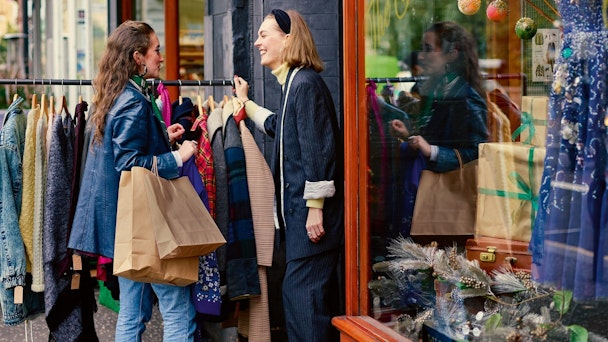Where you shop matters: The Social Element helped Visa share tales of independent stores
The Social Element won ‘Best Response to Change’ at The Drum Awards for Social Media in 2021, with its ‘Where you shop matters’ campaign for Visa. Here, the team behind the entry explains how it used social to share candid stories from shopowners.

Visa saw the third year of its campaign as an opportunity to support businesses through the pandemic.
2020 was the third year that Visa executed the Where You Shop Matters campaign, promoting independent merchants and encouraging local communities to support them. Of course, 2020 was not a year like its predecessors - with hard-working independent merchants faced with the consequences of lockdowns and retail closures.
Working with Saatchi, Visa developed #WhereYouShopMatters to connect with the public emotionally, encourage them to make a difference to small and independent merchants and shop locally. Executing across a nationwide ATL campaign, a copycat ad competition, dynamic DOOH, merchant points of sale and more - Visa wanted to use every tool at its disposal to help local independent businesses get support through the Christmas period.
Key to this approach was engaging directly with consumers and merchants alike on social media, which The Social Element was responsible for to help reinforce the key messages of the campaign.
Visa’s objective was to build awareness and ownership of Where You Shop Matters on social media, consolidating its role as a champion of independent local businesses and encouraging Brits to shop locally around the festive period and beyond, in spite of the ever-changing retail guidance.
As rules changed, we recognized that landing that message effectively on social required a consistent human tone of voice and an upbeat tone while being able to respond fast to the changing landscape thanks to Covid-19. This was a big challenge.
Together with Visa, we set out to leverage social to drive brand health among consumers, uplift brand affinity and differentiation and boost intentions among consumers to shop at local, independent businesses - whether that be in a physical or online capacity.
Strategy
Visa wanted to show the British public that Where You Shop Matters by revealing just how much their shopping means to independent local merchants - an idea coined with Saatchi. On social, we wanted to capture the behind-the-scenes moments from merchants that shoppers may not always witness - with honest, unfiltered and candid content that was made for social.
This was then deployed on social through three key activities - proactive engagement with individuals by creating Visa-led social media posts, reactive engagement to any responses and an organic content calendar, a strategy many agencies are not capable of executing.
Our approach to proactive engagement involved seeking people discussing relevant topics on social, including additional audiences not reached by ads, and engaging in highly personalized, friendly and cooperative discussions, fostering a genuine relationship with Visa.
Of course, to join these conversations naturally, the engagement team had to react fast to news events that would have the biggest impact on the moods and behaviors of consumers and merchants alike. To achieve this needed both a holistic understanding of how people felt about the changes, and an appropriate tone of voice that meant responses were written in an open and candid manner. Therefore, the insertion of Visa in the conversation was a natural extension of the discussion.
Key to this was building a comprehensive social listening platform. This meant the team understood the conversations among the key target audiences, identifying opportunities to proactively engage with those talking positively about related topics, to ultimately encourage people towards shopping with local independent businesses.
We therefore created the best engagement response matrix architecture across Twitter, Facebook, Instagram and LinkedIn to help consumers emotionally connect with the positive difference shopping local delivers, while also engaging local merchants to bring them into the conversation.
It was crucial to create a consistent engagement strategy across all platforms while ensuring the #WhereYouShopMatters hashtag was included for replies. When communicating directly with consumers, our strategy focused on personalized responses and prompting users with open questions to encourage a dialogue. The brand response length varied from platform to platform: for Facebook and LinkedIn, we wrote lengthier, more detailed responses; Twitter was shorter and more concise, as was Instagram.
When speaking directly to merchants, we researched each merchant profile, ensuring our replies were always relevant to their business, human and engaging. In all interactions, we had to adapt our response to the latest government guidelines and empathize with what changes meant for people.
Delivery
The initial stage of the strategic delivery involved conducting social listening research to identify the key high-frequency hashtags that are used not only over the Christmas period but all year round. We developed a community-led engagement strategy based on online conversations and how those related to shopping behavior. This meant Visa could join the public conversation, make emotional connections with shoppers, merchants and partners to encourage support for local shops, and ultimately build emotional revenue and brand affinity around the key message that where you shop matters.
The terrain in which we executed this campaign - one of almost constant changes to regional and national rules around shopping, hospitality and community services at large - meant we needed constant agility in message and responsiveness. We focused on local products and services and their appeal, and these were the services most vulnerable to change - like cafés, salons, butchers and bakers.
In response to changing circumstances, we also highlighted a sense of community, local economy, relationships and how merchants are adapting to the ongoing pandemic via click and collect, delivery and setting up an online presence. Our responses needed to first and foremost convey empathy and humanity - something we were able to achieve through adherence to a consistent tone of voice alongside allowing room for human intuition around context. This meant we were able to authentically respond and bring merchant stories to life while making the connection for the consumer around how their behavior could impact them.
During the prime Christmas period, we engaged with consumers and local businesses already involved in conversations about shopping at independent businesses. We also produced and published organic posts with shareable assets. These included stats and studies and merchant stories to engage and affirm the tangible, positive difference that shopping local delivers.
We encouraged merchants and partners to share stories about what shopping local and their local community means to them. In the follow-up conversations, we then asked consumers to recommend their favorite stores to encourage visits to the social media accounts of other small businesses.
Results
Within the conversations that took place, the campaign inspired a lot of long, positive comments. The average social media session is about five minutes, so longer comments indicate people were engaged enough to focus on the reply for a prolonged period of time, above other distractions on their phone and in the world around them.
Proactive engagement was also a massive success. After week one of the campaign, proactive engagement was consistently higher than reactive. This was due to an increased focus on reaching out proactively, as well as a more efficient methodology to identify opportunities and engage. At week 5, proactive engagement increased by over 50% in comparison to the weekly average, bolstering awareness for the campaign. Overall, proactive engagement volume was 54% higher in 2020 engagements compared with the campaign in 2019, despite the far trickier environment. This means that the campaign reached far more entirely new audiences - generating positive conversation for Visa outside of its ads or own social posts.
Overall the campaign was well-received, with positivity for Visa rising from 61% to 79% in our conversations from November to January. This was in large part thanks to our agility and preparedness for change as we chatted like humans with people to build a true brand connection.
This campaign was a winner at The Drum Awards for Social Media. To find out more, including which competitions are currently open for entry, visit The Drum Awards website.
Content created with:

The Social Element
We build genuine human connections through social media.We simplify social media marketing, and bring calm to the chaos.
Find out more
Visa
Find out more
